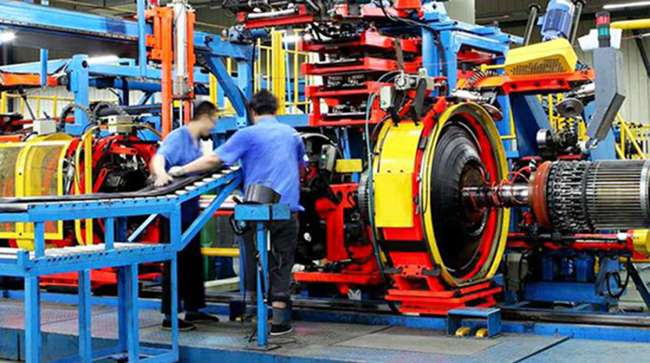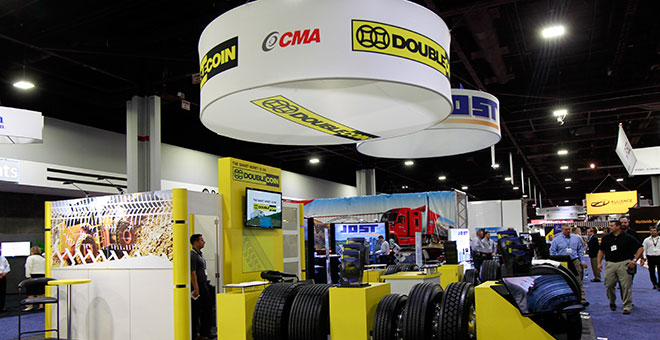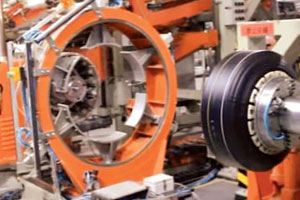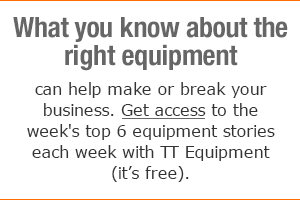Special to Transport Topics
Imported, Low-Cost Tires Gain Market Share

The new tire market for medium- and heavy-duty trucks continues to be dominated by familiar names such as Bridgestone, Michelin, Goodyear, Yokohama, Firestone and Continental. But an outside force has been making inroads into the domestic truck tire business in recent years, an industry analyst said.
“Chinese imports, without doubt, have eaten into the new-tire market share,” said Marshall Martin, senior research analyst for automotive and transportation at Frost & Sullivan.
Although several of the major tire companies preferred not to comment on the North American market impact of these imports, others confirm that the new entrants have significantly influenced the industry.
“During the past five years, there has been a surge of low-cost foreign manufacturers entering into the tire market,” said Adam Murphy, vice president of B2B marketing for Michelin.
Added Dan Funkhouser, senior director of commercial sales at Yokohama: “I think everybody has felt it a little bit.”
Price is the No. 1 factor driving customers to the new market entrants, according to researchers, considering the imports cost one-third the price of a premium new tire, Martin said.
Sales of Chinese import tires peaked in 2014 but dropped slightly when the United States imposed tariffs on Chinese tires the following year. Nevertheless, the low-cost import trend has remained strong.
It proved so dramatic in such a short time that the U.S. International Trade Commission launched an investigation in 2016 into whether China was distorting the U.S. market by dumping tires that its manufacturers exported. Dumping refers to foreign companies subsidizing or selling a product in the United States at less than fair value.
In 2016, the Department of Commerce preliminarily recommended tariff rates for Chinese tires based on data it gathered about China-based manufacturers Double Coin Holdings and Guizhou Tyre Co. But last year, ITC determined that low-cost Chinese imports were not harming the U.S. tire industry and so would not issue anti-dumping and countervailing duties on Chinese tires.

Double Coin displayed its tire products at the North American Commercial Vehicle Show in Atlanta in September. (John Sommers II for Transport Topics)
As a result, major manufacturers expected a new influx of Chinese import tires, but instead “we have seen the volume level off in recent months, despite the cancellation of the planned import tariff in 2017,” Michelin’s Murphy said.
Still, the recent slowing of imports could be an anomaly, and ITC’s action is too new to determine its long-term market contributions. The truck-tire industry needs more time to see the full effects, Frost & Sullivan’s Martin said.
Increased governmental pressure on Chinese manufacturers has caused some to exit the U.S. market. However, it also has opened more opportunities for the growing number of low-cost tire manufacturers based in other Asian countries, including South Korea, Indonesia and Vietnam. Plus, some China-based truck tire manufacturers pursue operations in neighboring countries solely to avoid U.S. tariffs on Chinese-made products.
Although tariff issues have lessened after ITC’s decision, attention has turned to the quality of low-cost imported tires. These budget imports “don’t last nearly as long,” Frost & Sullivan’s Martin said.
North America’s more established tire suppliers have found the same.
Michelin reports that some of its fleet customers claim that “some of these [imported] truck tire products have inconsistent construction quality, may actually wear more quickly and the resultant casing from the tire does not have the same quality as that from a major brand,” Murphy said.
In those cases, fleets require more frequent tire replacements, which could bump up the long-term cost of these budget import tires above that of premium tires.
Service is another factor in fleets’ tire-purchasing decisions. Some are hesitant to buy from Asian tire companies that are new to North America because of the lack of a well established service network.
They don’t typically have any warehousing or people on the ground that support fleets, said Walt Weller, senior vice president for China Manufacturers Alliance, a subsidiary of Double Coin, which has been in the U.S. tire market since the 1990s. “Their primary method of going to market is placing orders with a company located in China, and then shipping containers directly from the factory to the customers.”
Double Coin touts itself as different from the recent Chinese entrants into the North American market because it has salespeople, engineers and warehouses in the United States, as well as relationships with domestic original equipment manufacturers. “Our programs mimic the Tier 1 manufacturers’ programs,” Weller said, noting the company provides quality tires “at a reasonable price.”
Pennsylvania-based PGT Trucking generally is “a Michelin shop,” said Larry Cox, director of process improvement. But Cox recently was approached by a salesperson for a Chinese tire manufacturer new to the U.S. market, and the price “was indeed very tempting,” he said.
Cox soured on the idea, though, when the salesperson explained that the tires could only be sold by the ocean-shipped containerload.
“That told me all I needed to know about their service model,” he said. “They were interested in dropping off a containerload of cheap tires in my parking lot and not servicing me as a customer. No thanks.”
Established truck tire manufacturers promote their distribution and service as being better for fleets’ businesses.
Yokohama, for example, has been growing in the fleet business because of the strength of its distribution network, Funkhouser said.
“Fleets require service for their equipment to keep it up and running,” he said, noting many tire manufacturers coming into the marketplace now may not have those relationships.

Kebek via YouTube
The quality and service concerns may be starting to affect U.S. sales of low-cost imports. A study released last year by Frost & Sullivan shows that although 64% of U.S. fleets have purchased low-cost import tires at some point, only 23% intend to continue purchasing them.
Budget imports’ attractive up-front prices provide short-term savings over the premium tire brands, but wary fleets believe this doesn’t make up for other deficiencies or necessarily equate to overall savings. “Service translates into better uptime for our trucks,” PGT’s Cox said.
“Customers understand that and get what they pay for,” Yokohama’s Funkhouser said. To get tires with more technology, better retreadability, longer-lasting casings and longer tread life, “they’re going to pay a little more for it.”
Some of the new China-based truck tire manufacturers appear to be getting wiser to U.S. customers’ service and quality concerns.
“The reputation for some of these manufacturers was deserved back then, and in some cases still is,” CMA’s Weller said. “But I think the ballgame has changed. Test those tires now and … I think they would compare very favorably in many regards.”
Weller believes that Double Coin has penetrated the U.S. market over the past 20 years for the same reason that some new entrants are successful: It fills a demand gap left by the major manufacturers.
“Domestic manufacturers can’t supply the market,” he said. “The only place that has the capacity to meet that demand has been China.”
Industry analysts anticipate that U.S. truck tire purchasers will see continued expansion of imports within the marketplace and quality improvements in foreign manufacturers’ products. The Chinese manufacturers are expected to produce better-quality tires, although they will be priced “slightly higher than the previous versions,” Frost & Sullivan’s Martin said.
A Bridgestone spokesperson said the company “supports free and fair trade” but declined to comment further for this story. Firestone, Goodyear and Cooper also declined to comment. Attempts to speak with Continental weren’t successful.


